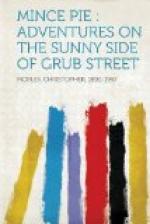Marathon is a suburban Xanadu gently caressed by the train service of the Cinder and Bloodshot. It may be recognized as an aristocratic and patrician stronghold by the fact that while luxuries are readily obtainable (for instance, banana splits, or the latest novel by Enoch A. Bennett), necessaries are had only by prayer and advowson. The drug store will deliver ice cream to your very refrigerator, but it is impossible to get your garbage collected. The cook goes off for her Thursday evening in a taxi, but you will have to mend the roof, stanch the plumbing and curry the furnace with your own hands. There are ten trains to take you to town of an evening, but only two to bring you home. Yet going to town is a luxury, coming home is a necessity. The supply of grape juice seems almost unlimited, yet coal is to be had catch-as-catch-can.
Another proof that Marathon is patrician at heart is that nothing is known by its right name! The drug store is a “pharmacy,” Sunday is “the Sabbath,” a house is a “residence,” a debt is a “balance due on bill rendered.” A girls’ school is a “young ladies’ seminary,” A Marathon man is not drafted, he is “inducted into selective service.” And the railway station has a porte cochere (with the correct accent) instead of a carriage entrance. A furnace is (how erroneously!) called a “heater.” Marathon people do not die—they “pass away.” Even the cobbler, good fellow, has caught the trick; he calls his shop the “Italo-American Shoe Hospital.”
This is an innocent masquerade! If Marathon prefers not to call a flivver a flivver, I shall not expostulate. And yet this quaint subterfuge should not be carried quite so far. Stone walls are made for sunny lounging; yet stone walls in Marathon are built with uneven vertical projections to discourage the sedentary. Nothing is more delightful than a dog; but there are no dogs in Marathon. They are all airedales or spaniels or mastiffs. If an ordinary dog should wag his tail up our street the airedales would cut him dead. Bless me, Nature herself has taken to the same insincerity. The landscape round Marathon is lovely, but it has itself well in hand. The hills all pretend to be gentle declivities. There is a beautiful little sheet of water, reflecting the trailery of willows, a green salute to the eye. In a robuster community it would be a swimming hole—but with us, an ornamental lake. Only in one spot has Nature forgotten herself and been so brusque and rough as to jut up a very sizable cliff. This is the loveliest thing in Marathon: sunlight and shadow break and angle in cubist magnificence among the oddly veined knobs and prisms of brown stone. Yet this cliff or quarry is by common consent taboo among us. It is our indelicacy, our indecency. Such “residences” as are near modestly turn their kitchens toward it. Only the blacksmith and the gas tanks are hardy enough to face this nakedness of Mother Earth—they, and excellent Pat Lemon, Marathon’s humblest and blackest citizen, who contemplates that rugged and honest beauty as he tills his garden on the land abandoned by squeamish burghers. That is our Aceldama, our Potter’s Field, only approached by the athletic, who keep their eyes from Nature’s indiscretion by vigorous sets of tennis in the purple shadow of the cliff.




